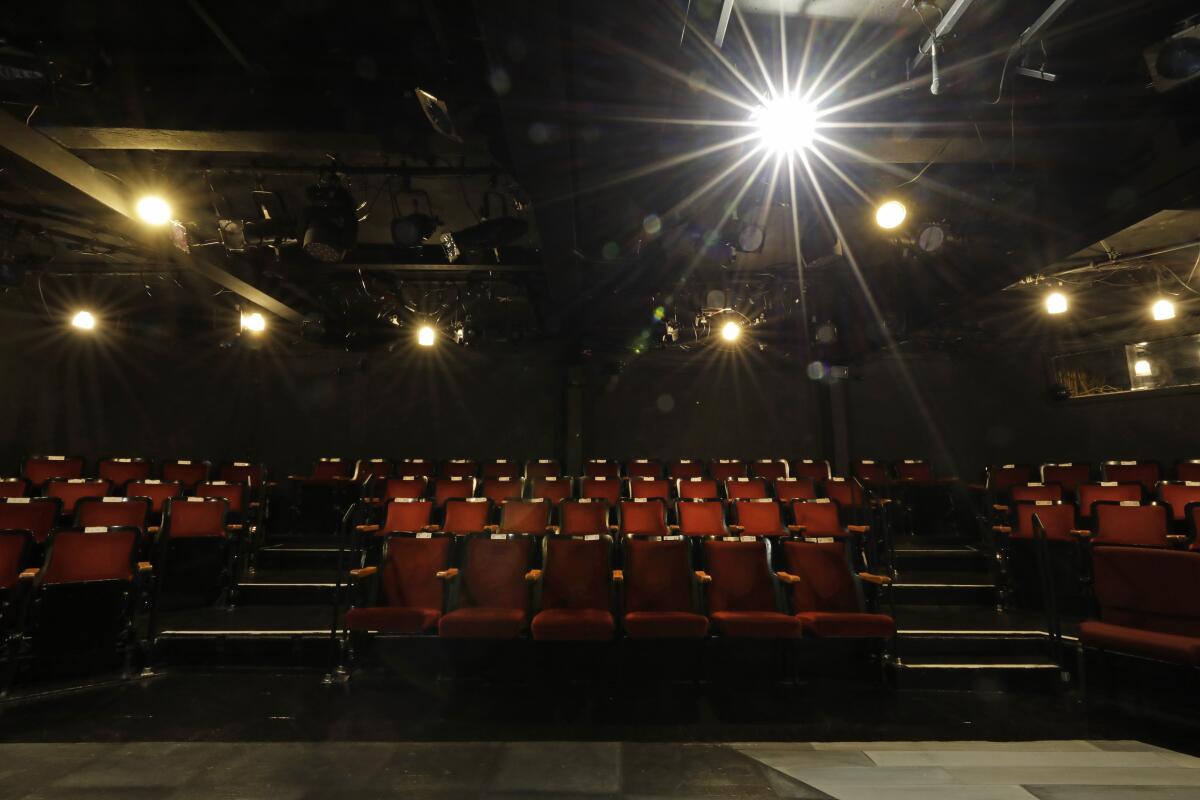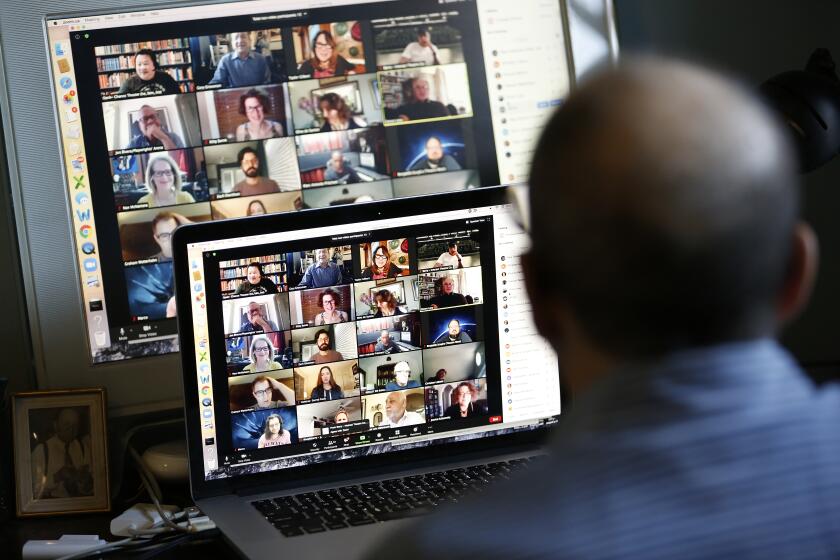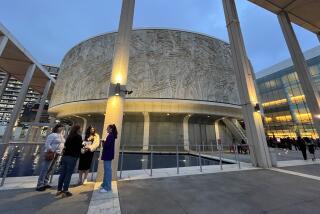How L.A.’s small-theater community is fighting for its life

- Share via
Democracy has a standing appointment on Tuesdays at 10 a.m. That’s when the leaders of L.A.’s intimate theater community meet on Zoom to discuss the issues that have been bedeviling them since the COVID-19 pandemic forced the closure of public venues in March.
Seven months is a ruinous amount of time to be shut down, and there’s no end in sight. Artistic directors have penciled in April as a possible return to in-person performances, but that target no longer seems as plausible as it once did. Optimism is in short supply in a nation that has spectacularly bungled its federal pandemic response.
But commiseration was not on the agenda at the September meeting I attended. Gary Grossman, producing artistic director of Skylight Theatre Company, presided over the proceedings, which involved 53 participants representing 40 theater companies from across the county and slightly beyond.
A spirit of waggish camaraderie prevailed but discipline was maintained. There were three immediate orders of business: a report on the group’s work with unions to come up with safety standards and protocols for reopening; a run-through of logistics for Together LA: A Virtual Stage Festival, which gets underway Thursday; and updates from the various subcommittees on matters of equity, diversity and inclusion.
The COVID-19 shutdown spurs the creation of Alternative Theatre Los Angeles, whose virtual festival runs for three weekends.
On the subject of safety, Martha Demson of Open Fist Theatre Company updated her colleagues on the headway that’s been made with three theatrical unions (Actors’ Equity, the Stage Directors and Choreographers Society and United Scenic Artists) to come up with local protocols for both indoor and outdoor performances. Beatrice Casagran of Ophelia’s Jump, who has been researching such things as air exchange rates, talked briefly about the affordability and feasibility of engineering interventions that can make indoor environments more healthful.
Demson and Casagran have been invited to join a statewide task force that will make recommendations to Sacramento for establishing COVID-19 safety guidelines and protocols for theaters and performing arts centers across California. “This is important,” Demson wrote in an email follow-up, “because L.A. County must adhere to the state guidelines first and foremost. And currently, there are no approved guidelines in place for theaters (thus all remain closed).”
Nobody’s crystal ball is functioning right now, so the focus is on pragmatic steps that need to be taken regardless of the pandemic’s timeline. Controlling what can be controlled is the most that can be done, and Demson and Casagran have inspiringly rolled up their sleeves to make reopening less of a wish and more of a possibility than it might otherwise be.
Nervous excitement was high for the Together L.A. Festival. Michael A. Shepperd of Celebration Theatre reassured everyone that the juggling of hosts (after a few had to pull out) was normal and under control. This extraordinarily ambitious event, which includes short digitally produced works from 34 companies, has turned theater people into multimedia auteurs — albeit auteurs who are hemmed in by all sorts of stringent public health rules, including the requirement that filming be done at home.
The festival is proof that something positive has emerged from an unprecedented crisis: With mutual survival on the line, L.A.’s network of small theaters has strengthened its communal bonds, pooling resources, expertise and ingenuity and setting aside (at least for the time being) competition.
This newfound unity seems to have translated into a campaign for equity, diversity and inclusion in local theater. Oanh Nguyen of Anaheim’s Chance Theatre marshaled his subcommittees to address perhaps the most pressing concern: accountability. Put simply, what criteria will be used to judge how well theaters are living up to their antiracism statements and what might accountability look like? The movement toward a set of standards was approached with the same intensity of collective purpose as the health and safety guidelines, indicating an awareness that EDI is as integral to the long-term flourishing of these theaters as a coronavirus vaccine.
Before the group welcomed me with a long round of introductions, I asked for information on the challenges these companies have been facing. I expected to hear a good deal about economic hardship. Instead, I was made privy to just how busy everybody has been.
Zoom has become the medium for internal meetings, special events with donors, check-ins with loyal audience members, readings and workshops with artists, and online performances. A few industrious types have branched into podcasting. Ten-hour days are routine.
One of the upsides of an online audience is that geography is no longer a factor. Time zones, however, are suddenly a consideration as the reach of programs has extended to national and even international viewers.
The downsides, however, aren’t negligible. Monetizing digital offerings is exceedingly difficult. Plays on Zoom (a costly platform for some) aren’t going to offset the losses of traditional revenue anytime soon.
Eventually, the two distinct audiences, in person and online, will have to be reconciled. Ideally, this will involve hybrid models. In other words, post-pandemic operations are not likely to follow pre-pandemic formulas. Zoom might not be forever, but the virtual stage isn’t going away.
A little digging revealed that the economic desperation is real, even if it’s not the first item on the agenda. Many who rent their spaces have negotiated new arrangements with their landlords, but they still will be carrying heavy debt burdens when business resumes. New American Theatre made the difficult decision to give up its home. Those that own their venues, like the Fountain Theatre, face the formidable costs of maintaining a building.
Many of the artistic directors said they had worked out plans to get through 2020. What frightens them is how long into 2021 it might take until they can reopen. They’re prepared to hold out until spring, but after that gloom sets in. These leaders have worked hard to stay in touch with their audiences, but they worry that this relationship, which took enormous time and care to cultivate, will begin to fade if the shutdown stretches beyond a year.
Compounding the economic uncertainty is California Assembly Bill 5, which established new rules for employing independent contractors, requiring many to be reclassified as employees with extensive labor protections.
Vanessa Stewart of Sacred Fools, who has been working on the issue for the group, painted a dire picture: “Moving from fee-based contracts to minimum wage will increase costs, and for some small theaters, that could mean an increase of expenses in excess of 90%. To survive, theaters will either produce fewer shows with smaller casts, or be forced to close. Sadly, many of the newer companies in our community that serve LGBTQ+ and BIPOC voices are saying they will not be able to carry the burden.”
The convergence of AB 5 and the pandemic, she said via email, “has created a double existential crisis for theaters across all of California, not just our community.” How does she see this playing out? “Unless the bill is amended or repealed, I fear that many of our theaters will not be able to return on the other side of the shutdown — which will come as a shock to many artists here who don’t understand that the ramifications of this bill are now threatening their artistic homes.”
These creative gig workers are already bearing the brunt of the shutdown. When I pressed institutional leaders on the extent of their own economic pain, there was an admission that it’s their “partner artists” — actors, directors, designers and all the other unemployed theatrical personnel — who are hurting most.
L.A.’s scrappy intimate venues are being tested like never before, but survival is built into their DNA. Their shoestring companies might seem fly-by-night, but many have been around for decades. Indeed, it was a source of pride for the elder statesmen in the field to announce in their introductions just how long their theaters have been in existence.
Productions from the Fountain, A.C.T., Pig Iron and La Jolla Playhouse are admirably ambitious at times, but they also reveal the limits of digital.
Company of Angels (founded in 1959) and the Odyssey Theatre Ensemble (founded in 1969) represent the vibrant old guard. They have some excellent, slightly younger company. The Matrix Theatre Company established its home in 1977, the Victory Theatre Center emerged in 1979, Skylight was born in 1983 and Pacific Resident Theatre arrived in 1985. These companies carry quite a bit of rich cultural history. They have no plans to vanish, but the future has never been more uncertain.
The pressure on L.A.’s intimate theaters has been relentless in the last few years. In 2016, Actors’ Equity instituted contractual changes requiring theaters with fewer than 100 seats to pay actors a minimum wage. There were significant carveouts, but a theater ecology built on virtually free acting labor was put under enormous stress.
AB 5 ratchets up the economic turmoil at a time of protracted crisis. The bill, which wasn’t designed with L.A.’s unique theater scene in mind, doesn’t provide a specific road map, Grossman said by phone.
Strengthening institutions isn’t a bad thing, he acknowledged when I brought up Soho Rep, a path-breaking and critically esteemed intimate theater company in New York that recently announced it was making eight artists salaried staff members for the 2020-21 season. But strengthening institutions, he said, requires thoughtful, long-term planning.
Developing a prestigious artistic pedigree requires money as well as bold thinking. Grossman said the example of Soho Rep would be possible if L.A. had access to the kind of financial support New York offers its arts organizations. That’s a big “if” for the city’s intimate theaters, but it was reassuring to hear that dreaming big is still possible for these institutions, even with nothing but storm clouds overhead.
“That’s what is so good about this group getting together,” Grossman said. “We’ve come together to solve the problems that the pandemic has created. It looks like it may be April 2021 before we can open our venues again. We’re asking ourselves how we’re going to reconnect with audiences. We all realize we have to change our operating model and together we’ll discover what that new normal will be.
“We’re not going to just switch the lights back on and pretend as if the pandemic, or the protests, or the We See You, White American Theatre’s call for change never happened. We know it’s going to be a long road back, but collectively, L.A.’s intimate theater community can and will thrive.”
More to Read
The biggest entertainment stories
Get our big stories about Hollywood, film, television, music, arts, culture and more right in your inbox as soon as they publish.
You may occasionally receive promotional content from the Los Angeles Times.












